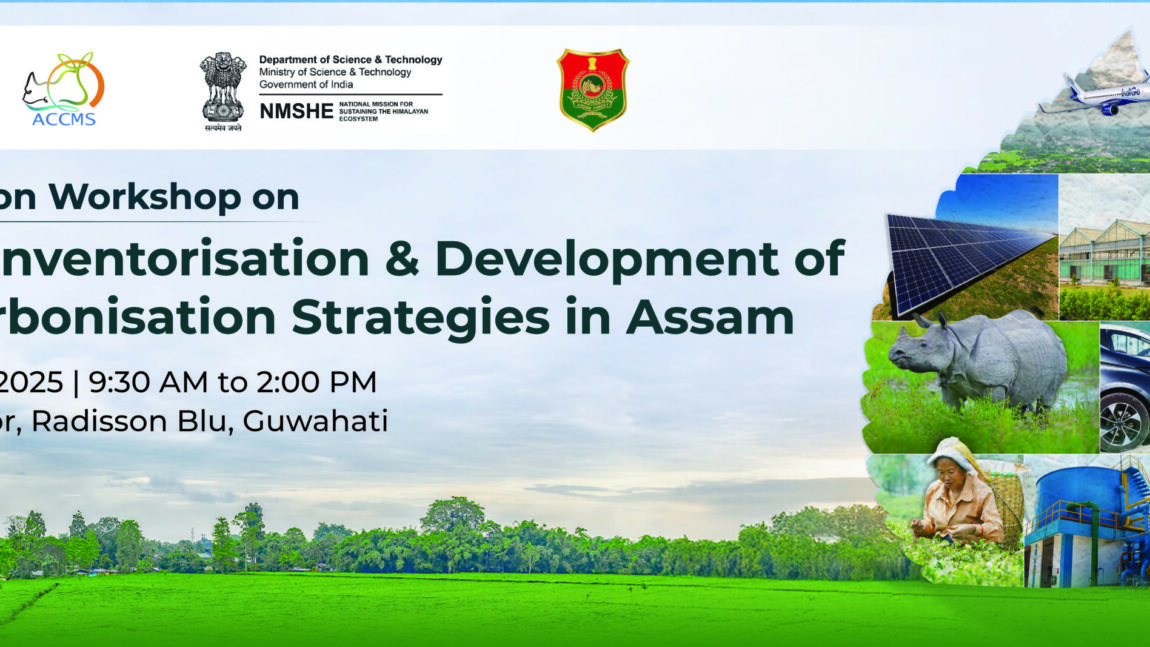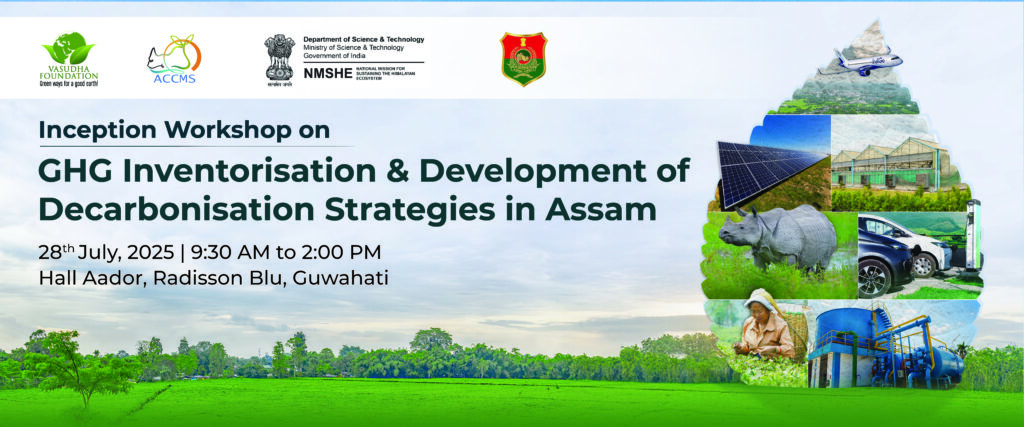
The Assam Climate Change Management Society (ACCMS), Environment, Forest and Climate Change Department, Government of Assam jointly with Vasudha Foundation, New Delhi organised a stakeholders’ consultation-cum-inception workshop on “GHG Inventorisation and Development of Decarbonisation Strategies for Assam” on July 28th from 11.00 Hrs to 14.00 Hrs in Guwahati. The aim of the workshop was to initiate a participatory process for assessing the historical and current GHG emissions towards development of long-term decarbonisation roadmap and 35 District Climate Action Plans, as an outcome of the Memorandum of Understanding (MoU) signed in Advantage Assam 2.0.
The workshop commenced with an inaugural session, witnessing high-level addresses from Dr. Ravi Kota, IAS, Chief Secretary, Assam; Sh. Ashok Kumar, Deputy Director General, Bureau of Energy Efficiency, Ministry of Power, India; Hirdesh Mishra, IFA, Chief Executive Officer, ACCMS, Environment, Forest and Climate Change Department, Assam; Sh. Ramen Chandra Malakar, ACS, Commissioner and Secretary to Government of Assam for Environment, Forest and Climate Change Department and Sh. Diganta Barah, IPS, Commissioner and Secretary to the Government of Assam for Tourism Department. They were joined by Ms. Nidhi Madan, Associate Director for Climate Policy, Shakti Sustainable Energy Foundation alongside Dr Rizwan Uz Zaman, Technical Consultant, ACCMS, Environment, Forest and Climate Change Department, Assam and Sh. Srinivas Krishnaswamy, Chief Executive Officer, Vasudha Foundation.
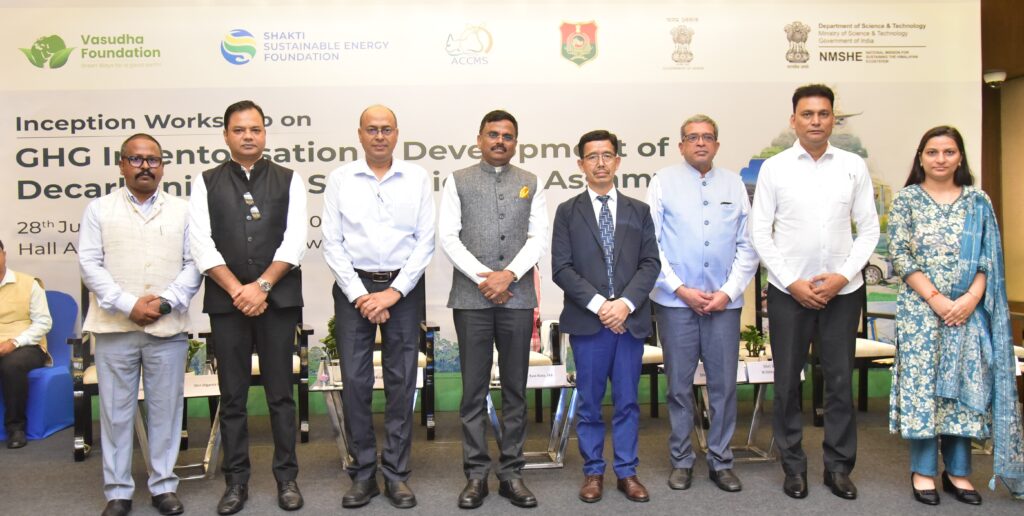
Dr Rizwan Uz Zaman opened the inaugural session by welcoming the esteemed speakers and setting a context for the stakeholders’ consultation cum inception workshop. This was joined by Sh. Srinivas Krishnaswamy who, through his address, emphasised a bottom-up approach for developing holistic decarbonisation and local climate action plans. He explained that these plans should focus on both mitigation and adaptation interventions across all 35 districts of Assam. The idea is to create geographically specific climate action plans that are tailored to local needs and are based on community engagements. Further to it, Ms Nidhi Madan reaffirmed Shakti Sustainable Energy Foundation’s commitment to collaborate with Assam to drive sustainable and inclusive development.
Sh. Diganta Barah, IPS, highlighted the sustainability embedded in the Assam Tourism Policy 2022, which promotes responsible, inclusive, and sustainable tourism with attention to ecological and cultural sensitivities. He further emphasised on tourism’s dual role—as a contributor to climate change and a potential part of the solution—and stressed the need for integrated, cross-sectoral strategies.
Sh. Ramen Chandra Malakar, ACS emphasised that decarbonisation goes beyond emission reductions, offering co-benefits such as cleaner air, healthier ecosystems, and improved quality of life. He underscored the need for cross-departmental collaboration to address climate challenges effectively. Sh. Ashok Kumar highlighted the urgency of climate action, citing breached planetary boundaries and rising temperatures, warning that climate displacement could affect 1.2 billion people by 2050. He also commended ACCMS as one of a kind agency at a State level – leading innovations and building cohesion among climate initiatives.
Dr Ravi Kota, IAS echoed the competing urgencies of climate action vis-a-vis development, and highlighted the need for additional revenues to tackle both in an effective manner, particularly in context to India’s rapid urban expansion and its implications for energy systems.
He commented, “Convincing all stakeholders on the urgency of action through dejargonised communication will bring all stakeholders together towards this common cause.” He also pointed to the need for a bottom-up and community centric approach to decarbonisation and climate action, acknowledging ACCMS’ leadership and role in enabling this.
The role of institutional partnerships, community engagement and financial linkages were reflected throughout the inaugural addresses.

The inaugural session was followed by a knowledge sharing segment on data-driven approaches to energy planning in Assam. Mr. Rahul Patidar and Ms. Saundharaya Khanna from Vasudha Foundation presented on the theme “From Data to Decision-Making and Opportunities for Assam”. They highlighted the importance of leveraging data for informed decision-making in Assam’s energy and climate planning, and discussed the role of evidence-based approaches in identifying actionable opportunities for the state. The India Climate & Energy Dashboard (ICED) – a joint initiative of NITI Aayog and Vasudha Foundation was showcased as a ready data and decision making tool. In continuation, Dr. Anjali Jain, Consultant (Energy), NITI Aayog introduced the India Energy Security Scenario (IESS) tool and its application in the context of Assam. The presentation focused on how the IESS can help visualize long-term energy pathways for the state, enabling policymakers to assess the impact of various interventions on energy demand, supply, and emissions.
A panel discussion on “Decarbonising Energy in Assam and Promoting Localised Climate Action” with Q&A moderated by Mr. Raghav Pachouri, Associate Director, Vasudha Foundation followed.
Esteemed Panelists included:
- Mr. Dhrubajyoti Nath, ACS, Joint Commissioner, P&RD Department, Assam
- Mr. Dibyajyoti Karjee, Assistant Commissioner, Transport Department, Assam
- Mr. Simanta Saikia, Tourism Development Officer, Tourism Department, Assam
- Mr. Rituraj Phukan, Convenor and Climate Editor of Mahabahu Climate Forum
The panel discussion underlined the role of government initiatives and policies in promoting systemic shifts towards decarbonisation and local climate action, with panelists delineating on the challenges faced and impact delivered through Amrit Sarovar Mission, PM Awas Yojana, Electric Vehicle Policy 2021, Vehicle Scrappage Policy 2022 and Amar Alohi Homestay Scheme among other initiatives. Community based afforestation, rural waste management programmes, disaster preparedness and other good practices featuring local communities as owners and agents of change were also highlighted.
Key Takeaways from the Panel Discussion:
- Energy use, climate realities and risks vary by districts. Decarbonisation and climate solutions too would have to be context-specific and tailored to local sectoral needs, instead of pursuing a one size fits all approach.
- Data can fuel this momentum – with platforms like ICED and IESS readily available to adapt for Assam and integrate for decision-making. The granular data made available on these platforms are also crucial for understanding local and sectoral variances and designing context relevant policy solutions.
- Involving the last-mile is crucial. Local communities will have to be kept front and centre while developing Assam’s decarbonisation and climate action plans – communicating the objective in a dejargonised manner, understanding what climate resilience means for them and their priorities for the district decarbonisation and climate action plans.
- Collaboration and partnership for informed policy making that is based on principles of equity, justice and resilience – both within government and amongst government, civil society, academia, private sector and other stakeholders. Such a partnership will enable cross-exchange of vital information, and holds the key for scaling efforts and delivering a holistic impact in a timely manner.
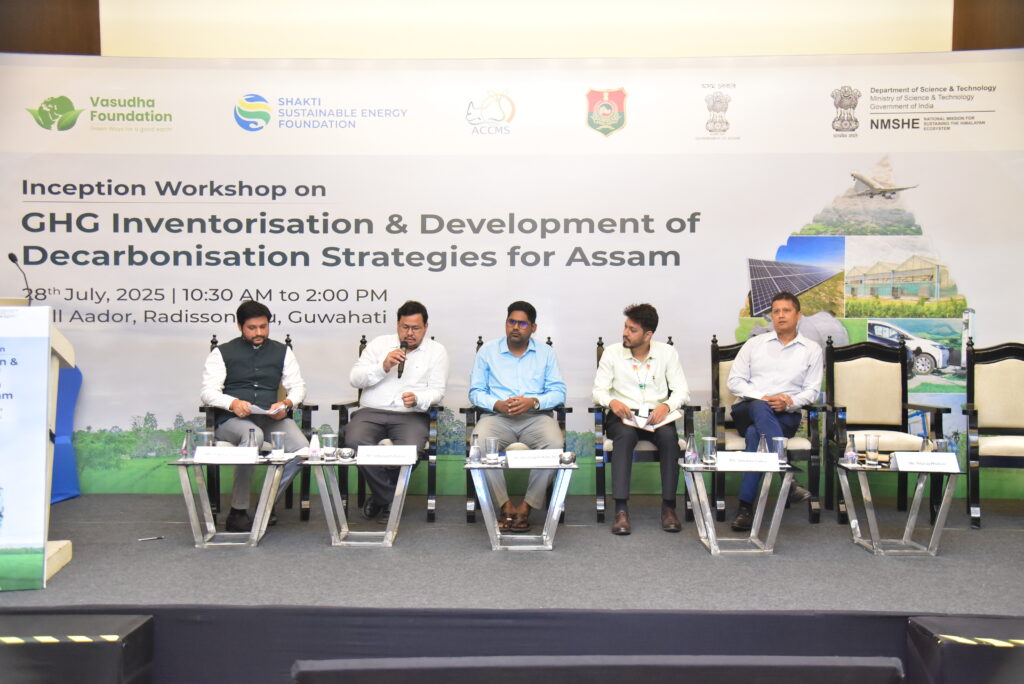
The panel discussion paved the way for the inception workshop, led by Ms. Rini Dutt, Associate Director – Climate Policy & Community Engagement, Vasudha Foundation and joined by Sh. Subrata Chakraborty, Associate Director – Climate Programme, WRI India. A detailed discussion on the data requirements for developing historical and current GHG inventories, available data and gaps ensued. Data templates were presented, and the nodal officers of respective departments were apprised on these requirements.
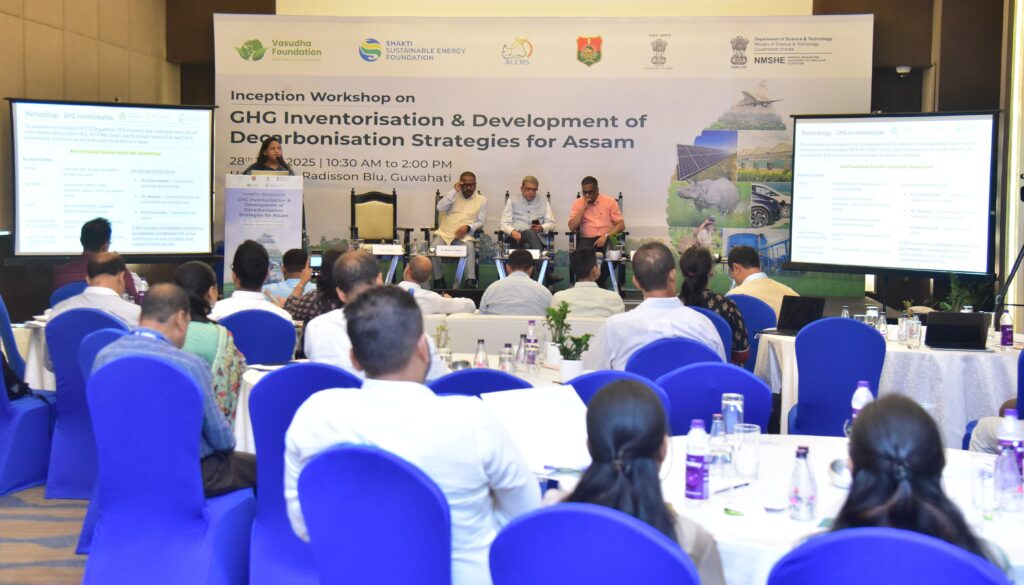
The stakeholders’ consultation cum inception workshop closed with thanking the guests, speakers and participants. As next steps, data templates will be shared and one to one meetings would be conducted with the respective nodal officers on data and information. An all-partners’ meeting and other stakeholder consultations will further be pursued from time to time to inform the development of the decarbonisation and local climate action plans.




